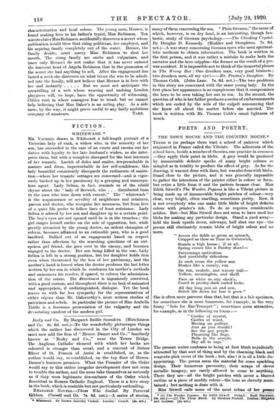F IC T 10 N WHITEWASH. * MR. Vacama. draws
in Whitewash a full-length portrait of a Victorian lady of rank, a widow who, in the minority of her son, has succeeded to the care of an estate and carries out her duties with loyalty to her late husband's wishes, as she inter- prets them, but with a complete disregard for the best interests of her tenants. Lavish of doles and smiles, irreproachable in manner and dress, imperturbable in her self-confidence, this lady bountiful consistently disregards the rudiments of sanita- tion—where her tenants' cottages are concerned—and is vigor- ously backed up in her parsimony by a grasping and unscrupu- lous agent. Lady Selina, in fact, reminds us of the ribald rhyme about the "-lady of Berwick, who . . . distributed buns to the men who were down with enteric." The " whitewash " is the acquiescence or servility of neighbours and retainers, parson and doctor, who recognise her meanness, but from love of a quiet life prefer to follow lines of least resistance. Lady Selina is adored by her son and daughter up to a certain point. The boy's eyes are not opened until he is in the trenches ; the girl ranges herself earlier on the side of opposition, but, while greatly attracted by the young doctor, an ardent champion of reform, becomes affianced to an estimable peer, who is a good landlord. Bullied out of an engagement based on respect rather than affection by the searching questions of an out- spoken girl -friend, she goes over to the enemy, and becomes engaged to the doctor. Her son being killed in the war, Lady Selina is left in a strong_ position, blither daughter holds firm even when threatened by the loss of her patrimony, and the mother's hand is forced when the doctor produces the last letter written by her son in which he condemns his mother's methods and announces his resolve, if spared, to reform the administra- tion of the estate. The dencniment is ingeniously contrived, with a good curtain, and throughout there is no lack of animated and appropriate, if undistinguished, dialogue. Yet the book leaves us with far less sympathy for the representatives of either regime than Mr. Galsworthy's more serious studies of patricians and rebels. In particular the picture of Miss Arabella Tidclle is a fearsome presentation of the vulgarity and the devastating candour of the modern girl.


































 Previous page
Previous page